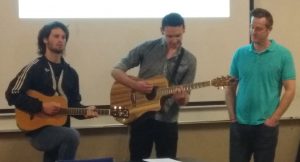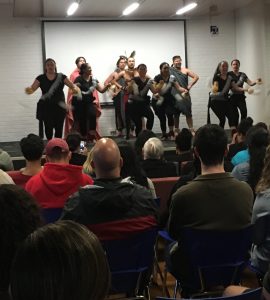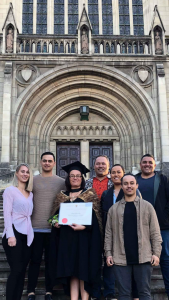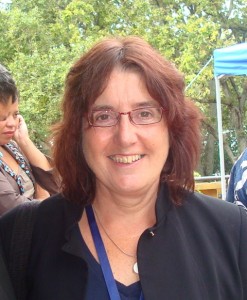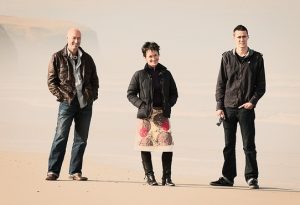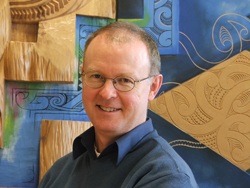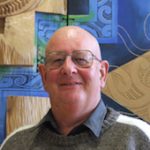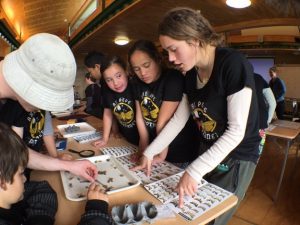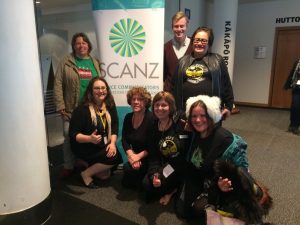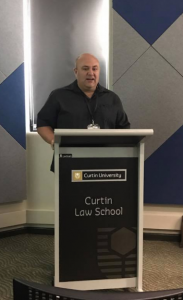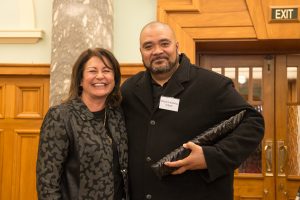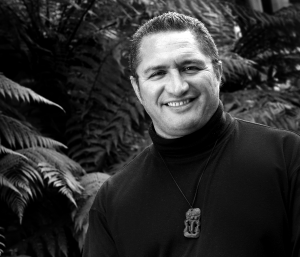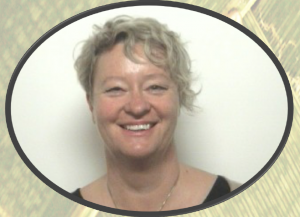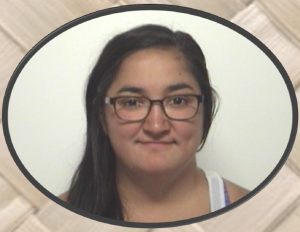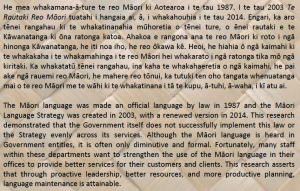Undergraduate research through te reo Māori
E kīa ana, he wāhi rangahau te whare wānanga, engari, kāore e waiho ana anake taua mahi mā ngā ahorangi, mā ngā pūkenga, mā ngā ākonga paerunga rānei. Uru ai hoki ngā ākonga paeraro ki roto i ēnei momo mahi. I tēnei hēmeta e toru ngā mahi rangahau i mahi ai ā mātou tauira reo Māori o te Whare Wānanga o Ōtākou.
I mahia ngātahitia te “Kāinga Waewae” e ngā tauira o ngā karaehe reo, arā, he rōpū nō ngā tāngata o MAOR112 Te Kākano, te MAOR212 Te Pihinga, me te MAOR312 Te Māhuri. I tēnei tau ka rangahaua ngā mahi a ngā tini tari o te Kete Aronui (Humanities). He momo whakaaturanga tā tēnā rōpū, tā tēnā rōpū mō te tari i rangahau ai rātou.
Ko tēnei te tau tuatahi i tū ai te pepa MAOR206/306 Ngā Pūkenga Tuhi, arā he kōhi hei whakapakari i ngā pūkenga, i ngā āheitanga e pā ana ki ngā momo tuhituhinga. Tokowhā ngā kaimahi o Te Tumu i whakaako i te pepa nei. Ko te tuhituhi ā-whare wānanga tētahi o ngā kaupapa, kia reri ai ngā tauira mehemea ka tahuri rātou ki te tuhi i ā rātou rangahau o ngā tohu paerunga i roto i te reo Māori. Mō tēnei pepa, ka hangaia e rātou he pānuitanga ānō nei kei tētahi hui rangahau rātou.
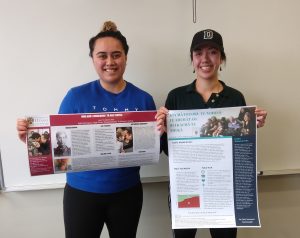
Ka riro i a Lyric Bird (taha mauī) te paraihe mō te pai o te whakapaipai o tāna pānuitanga e pā ana ki te tāmoko; ka whiwhi a Orini Herewini-Macdougall (taha matau) ki te paraihe mō te pai o te rangahau, mō te hunga “ahi matao”, arā, mō te hunga kāore e uru ana ki ngā mahi a ō rātou marae.
I tēnei wiki hoki ka tū te konohete a ngā tauira o MAOR308 Ngā Hākinakina a te Māori, ko Kelly Ann Tahitahi te kaiako, ā, ko Karyn Paringātai te kaiwhakahaere. Nā ngā tauira ngā waiata i rangahau, i tito, i whakarite; ko te “Reaka Z” te kaupapa, arā, ko te whakatipuranga e ako ana ki te whare wānanga ināianei. Tokomaha ngā tāngata i tae mai ki te mātakitaki, ki te whakarongo ki ngā waiata mō ngā āhuatanga o te ao hurihuri o tēnei wā.
Ngā Pae o te Māramatanga Summer Internships
Are you a Māori pre-doctoral student who is interested in advancing your skills and capacity in Indigenous research, and wanting some paid work over summer? Or do you know someone who may be interested? Ngā Pae o te Māramatanga have 27 Summer Internships on offer. Closes 10 October.
**** CLICK HERE TO FIND OUT MORE ****
Latest Masters of Indigenous Studies Graduate
Graduation is always the culmination of a lot of hard work. At last week’s graduation, we had our latest graduate, Margaret Courtney, walk across the staff to collect her hard-earned Masters of Indigenous Studies degree certificate. Margaret, of Te Arawa (Tūhourangi,
Ngāti Whakaue, and Tapuika), also holds an LLB from Waikato University, and works as a Regional Advisor for Te Puni Kōkiri. I asked her to send me a short account of her studies, and the abstract of her research dissertation. Koia kei a koe, Margaret!
“My journey to complete my Masters qualification was a journey of personal growth, perseverance and enlightenment. Combining my experience of Whenua Māori, the Native Land Court system and integrating it with the history of our tūpuna and iwi has helped to fill knowledge gaps for my whānau. Given our ‘nuclear family’ upbringing my research emphasised the importance of Whenua Māori as a connection to our tūpuna but also strengthens our Whānau Mātauranga. It is this knowledge that we can pass onto our tamariki and mokopuna.
“The Master of Indigenous Studies programme at Te Tumu was the best option for me given I live and work in Rotorua. It provided a part time online option which complimented by mahi and lifestyle. The paper offerings provided choice and completing the dissertation cemented my learnings. I enjoyed the mixed forms of delivery and assessments.
“I am thankful for the support and patience of my supervisor Dr Paerau Warbrick. He provided good advice, steered me on track when needed, and helped me to extend my knowledge and research skills. Ka nui te mihi ki a koe, e whānaunga! To my whānau, your continued support is unwavering!”
Abstract
This research supports the view that whenua Māori is important in today’s global environment and remains a vital connection to our tūpuna, our iwi and our whānau history.
This is illustrated through an exploration of the author’s connection to Tūhourangi, an iwi of Te Arawa, the impact that the Native land legislation had on Tūhourangi and specifically the whenua, Rotomahana Parekārangi in the nineteenth century. The research explores the path of Rotomahana Parekārangi through the Native Land Court regime. The research concludes with an example of how the author’s whānau are making attempts to transmit their collective whānau mātauranga to the younger members of their whānau. This is in order to provide the whānau with experiences of the whenua, of their iwi and to understand the importance of their connection to the whenua derived from their tūpuna. It is important that the younger generation are cognisant of these connections and whānau mātauranga as, in time, they will become the kaitiaki of the whenua, and will need to pass this knowledge onto their mokopuna.
Former student wins book award
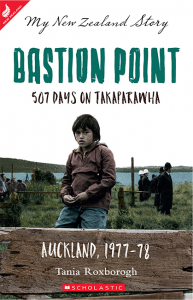 He mihi nunui ki a Tania Roxborogh who recently won the Esther Glenn Award for Junior Fiction in the New Zealand Book Awards. Her book is titled Bastion Point: 507 Days on Takaparawha.
He mihi nunui ki a Tania Roxborogh who recently won the Esther Glenn Award for Junior Fiction in the New Zealand Book Awards. Her book is titled Bastion Point: 507 Days on Takaparawha.
Tania is an alumna of Te Tumu having completed a degree in Māori Studies here in 2015.
In a blogpost she discusses her excitement at winning this award.
Koia, kei a koe, Tania.
Te Tumu Graduates in May 2017
Eight Te Tumu students graduated in the May ceremonies last weekend.
Hine Te Ariki Parata-Walker (Ngāti Porou, Ngāi Tahu) completed a Master of Indigenous Studies (MIndS). Her research topic, supervised by Professor Paul Tapsell, investigated procedures around hahunga (the exhumation of ancestral remains) in modern times. Select Parata-Walker abstract for further details.
Karurangi Salu (Tainui, Ngāpuhi, Samoan) gained a BA(Hons) with her research, entitled “Māku anō tōku nei whare e hanga”, looked at how haka and waiata are used in teaching at Te Whare Kura o Rākaumanga to pass on Tainui history, reo, tikanga and whakapapa. Dr Karyn Paringātai supervised. Select Salu abstract for further details.
Rieko Hayakawa also graduated with a PhD in Pacific Islands Studies. See here for details.
Congratulations also to our BA graduates.
Alice Anderson (Ngāi Tahu), BA in Indigenous Development/Te Kura Matanui.
Luaipouamalo Gafa (Samoan), BA in Pacific Islands Studies.
Maiora Puketapu-Dentice (Te Āti Awa, Tūhoe), BA in Māori Studies and History.
Tataioterangi Reedy (Ngāti Porou, Te Whānau a Apanui), BA in Indigenous Development/Te Kura Matanui.
Roma Simmons-Donaldson (Ngāti Porou, Taranaki, Tainui, Ngāti Tūwharetoa), BA in Māori Studies.
Te Tumu graduand in the news
Matani Schaaf is featured in the Otago Daily Times [click here] on his PhD journey. It’s a lovely story on both Matani and his son Marckis who graduate today.
Rangahau Roundup
Semester 2 has been busy on the research front for Te Tumu staff and postgrads.
Te Tumu is still progressing with Te Kōparapara, a book on Māori culture, history and contemporary society, which is designed as a textbook for MAOR102 as well as for a general audience. Prof Michael Reilly is the main driver of this project, and has been ably assisted by Dr Gianna Leoni. This book, with an array of essays mainly written by Te Tumu staff, is under contract with Auckland University Press and should appear sometime in 2017.
Faculty News
Associate Prof Jenny Bryant-Tokalau has been having a busy Research and Study Leave. She has given two presentations in the USA in the last semester: ‘Food security and other risks in a time of climate change: traditional and contemporary forms of resilience’, to the Department of Anthropology, and ‘Small Island Pacific States: Dealing with Climate Change’ to the Department of Geology at Wheaton College in Massachusetts. In December she presented ‘Working in Context: The Commercial Potential of Customary Pacific Land’ at the Aotearoa New Zealand International Development Studies Network Ninth Biennial Conference ‘Pacific Currents, Global Tides’ Wellington, and ‘Dealing with disasters and social change’ to the Asia Pacific Biocultural Health ‘Big Ideas’ Workshop, in Dunedin, December.
Jenny has also had one chapter in an edited collection appear during this period: ‘Community responses to floods in Fiji: lessons learned’ In Calabrese, John (ed.) Humanitarian Assistance and Disaster Response: Rising to the Challenge. MAP Series, Middle East Institute, Washington. August (2016) issue. Click here to access it. She also has two book reviews published in New Zealand and Pacific Studies November, 2016; and Journal of the Polynesian Society 125 (1), 2016.
Jenny is planning to return to the Solomon Islands to carry out in-depth interviews on small and medium businesses on Kastom land, as well as to finalise book edits for Palgrave MacMillan Anthropology of Disaster Series: What the Pacific Islands can teach New Zealand about Climate Change.
As previous posted, Prof Paul Tapsell spoke at the Indigenous Plenary at the WAC-8 Conference in September. Paul and Associate Prof Merata Kawharu are also part of the large three-year Mauri-Whenua-Ora project within the National Science Challenge Land and Water: Toitū te Whenua, Toiora te Wai. This project is the only fully Māori-led and Māori-integrated research programmes of all NSCs nationally, and is looking at Maori land and water based innovation including: (1) micro economy development “Pa to Plate”, (2) Shared iwi innovation for Taitokerau as a model for other iwi and (3) a regional (Te Hiku) study looking at Maori land suitable use and value chains. Merata also has a forthcoming publication, “Indigenous Entrepreneurship: Cultural Coding and the Transformation of Ngāti Whātua in New Zealand” in the Journal of the Polynesian Society, 125, 4 (2016): 385-408.
Associate Prof Lachy Paterson gave a presentation entitled ‘U.S. Slave “Humor” in New Zealand Newspapers’ at the 109th Annual Meeting of the Pacific Coast Branch of the American Historical Association at Waikoloa, Hawai’i. He is currently writing up this paper, which looked at how imported racist discourses permeated New Zealand’s English-language newspapers. Lachy returned to his ongoing obsession with Māori-language newspapers, with “The New Zealand Government’s Niupepa and their Demise” published in the New Zealand Journal of History, 50, 2 (2016): 44-67.
Together with Associate Prof Angela Wanhalla (Dept of History and Art History), he has also sent off their manuscript “He Reo Wahine: Māori Women’s Voices from the Nineteenth Century” to Auckland University Press, and it should appear sometime in 2017.
Over summer Prof Michael Reilly hopes to write a paper concerning the research relationship between William Wyatt Gill of the London Missionary Society, and Mamae of Ngāti Vara, a church minister, on Mangaia during the 19th century. In the longer run, he wants to begin writing chapters for an introduction to Māori tribal history, drawing from the draft text used as a ‘course reader’ in MAOR 207 Ngā Kōrero Nehe – Tribal Histories. Michael is passionate about this project but acknowledges that it may take several years to finish. He has also completed the final editorial corrections for a paper to be published this December, “Narrative Features and Cultural Motifs in a Cautionary Tradition from Mangaia (Cook Islands)”, in the Journal of the Polynesian Society 125, 4 (2016): 357-384.
Dr Jim Williams has a forthcoming article in the Journal of the Polynesian Society, entitled “Seafood Gardens”. Jim has a busy summer planned, fininishing off an essay for Ethnohistory, entitled “Layers of History” explaining how certain activities are repeated at powerful places, giving rise to notions of circularity of time, but layered, like whakapapa; he will also be giving a presentation in January at the American Historical Association conference in Denver. One of Jim’s students, Katrina Bryant, has just completed her Master of Physiotherapy.
In October newly graduated Dr Gianna Leoni gained a new position based in Te Tumu, that of a Ngā Pae o te Māramatanga postdoctoral fellow, with the research project “Te Ōhanga o te Pīpīwharauroa – Expressing our Economic Aspirations”. Click here for more details.
 In June, Megan Pōtiki presented on her doctoral research on language loss at Ōtākou, at He Rau Tumu Kōrero IX at Te Rau Aroha Marae in Bluff. This event was run by Te Pouhere Kōrero, the national Māori historians organisation. Megan has also published two journal articles, “The Otago Peninsula: A unique identity” in Shima, 10, 1 (2016): 67-84 [Potiki-Shima-v10n1-3]; and ‘Te Haka Nā Ngā Herehere’ in Te Pouhere Kōrero 8 (2016): 6 –25, and is currently working on another article, “Māori song composition and reclamation of traditional tribal borders” based on a mōteatea she composed for the Te Tumu Kapa Haka group.
In June, Megan Pōtiki presented on her doctoral research on language loss at Ōtākou, at He Rau Tumu Kōrero IX at Te Rau Aroha Marae in Bluff. This event was run by Te Pouhere Kōrero, the national Māori historians organisation. Megan has also published two journal articles, “The Otago Peninsula: A unique identity” in Shima, 10, 1 (2016): 67-84 [Potiki-Shima-v10n1-3]; and ‘Te Haka Nā Ngā Herehere’ in Te Pouhere Kōrero 8 (2016): 6 –25, and is currently working on another article, “Māori song composition and reclamation of traditional tribal borders” based on a mōteatea she composed for the Te Tumu Kapa Haka group.
As part of Māori language week this year Tangiwai Rewi was asked to give a Library research floor talk on Wednesday 13 July on the Ngāruawāhia Turangawaewae regatta, which comes out of her doctoral research and an article last year in the Journal of the Polynesian Society. A display themed around the article was shown in the Hocken Collections for seven weeks as part of Māori language Week. Click here for more details and pictures.
Tangiwai has participated in the Ahi Pepe Resource launch 27 October and Wānanga 26-28 October. She was a collaborator in this project which created an immersion te reo Māori Moths resource depicting the 600+ species endemic to the South Island. Twelve schools were invited to the Wānanga, to participate, learn how to trap, kill and present moths for identification and preservation. Also launched that night were the bilingual and total immersion resource covering the four areas of the South Island.
Tangiwai also attended the SCANZ (Science Communicators Association NZ) conference on 14 November as part of the panel who discussed the resource and preservation of moths.
Tangiwai went north to attend the Te Awamārahi poukai on 24 November. (Poukai are ceremonial gatherings held on Kīngitanga marae.) This was an opportunity to take the photo display back to her marae especially as some of people featured in the photos come from that marae. The photo boards were put on display along with other harakeke resources found along the riverbanks. Needless to say, Tangiwai also vigorously promoted Te Tumu and the University of Otago to all the people who came to view the display.
Postgraduate News
Congratulations to Matangi Schaaf who graduates in December with a PhD; and also to Nikki Walden (Taranaki, Te Āti Awa) and Nurul Sultan with Master of Indigenous Studies degrees. Click here for more details.
Two of our PhD students are submitting in December: John Birnie and Taomi Qiliho-Tapu, and Tāwini White (Ngāi Tahu, Te Rarawa) is making the final amendments to her MA thesis. Rieko Hayakawa‘s PhD thesis ‘Possibility of Telecommunication Universal Service in the Pacific Islands; Case studies of Vanuatu, PEACESAT and USPNet’ has just passed examination. We look forward to these students graduating in the near future.
We have a new PhD student who has just started, Raaniera Te Whata (Ngāpuhi, Ngāti Porou, te Whānau a Apanui), researching communities-based Māori land development in the Bay of Islands. Raaniera comes into doctoral studies after completing an LLB in Auckland and a Master of Indigenous Studies in Te Tumu.
In August Erica Newman who is undertaking PhD research on Fijian Orphanages (1874-1970) presented at the Anthropology and Archaeology Postgraduate Symposium held here in Dunedin.
Matiu Payne (Ngāi Tahu, Ngāti Mutunga), who is researching the impact of government agencies on tikanga whāngai for his doctoral studies, has just been to the Australia New Zealand Law and History Society conference at Curtin University in Perth presenting on his PhD research.
Kelli Te Maihāroa (Waitaha) who is researching Māori peace traditions and their relevance to whānau today, has co-edited an edited collection: H. Devere, K. Te Maihāroa, & J.P. Synott (eds.) Peacebuilding and the Rights of Indigenous Peoples: Experiences and Strategies for the 21st Century, (Springer: Cham, Switzerland, 2016), which includes two co-written and one sole-authored articles by Kelli. She also has an article forthcoming, “Whanaungatanga: Relationships in a One Day Te Reo Māori School of Excellence” in Theobald, M. (Ed.) Friendships in Multilingual Settings (Sociological Studies of Children and Youth, Vol 21 (2016)). Emerald. Kelli, who is a lecturer in the College of Education, also presented at the Teacher Education Forum of Aotearoa New Zealand, in June/July in Dunedin, and at International Indigenous Research Conference in November in Auckland.
Postgraduates Graduating
Te Tumu congratulates our postgraduate students who are graduating this December.
Doctor of Philosophy
Matani Fakatotua Schaaf
Supervisors: Dr. Paerau Warbrick, Prof. Michael Reilly (until 2012, Prof. Brendan Hokowhitu)
Title: Motivation and Burnout in Professional Pasifiki Rugby Players
This thesis examined the participation motivation among professional Pasifiki rugby players. Dominated by Western theories and models, rugby participation research has overlooked the inclusion of a theory or model that is significant to Pasifiki peoples. This research identified what cultural factors exist, that motivate so many Pasifiki peoples to play rugby. This research also highlighted a mismatch between the lived realities of Pasifiki rugby players’ experiences of motivation and burnout, compared to the lived realities of Palāngi rugby players. The most notable outcome, was that Pasifiki rugby players’ experiences were dramatically intensified, by familial, cultural, spiritual and financial obligations; which manifested in burnout, mental illness, substance abuse, binge drinking and failed attempts at suicide.
Master of Indigenous Studies
Te Tumu also has two Master of Indigenous Studies (MIndS) students graduating.
Nurul Sultan, supervised by Dr Lyn Carter, researched “The Relevance of Indigenous Knowledge in Contemporary Research Methodologies”.
Nikki Walden (Taranaki, Te Āti Awa), supervised by Assoc Prof. Merata Kawharu, undertook her MIndS research on “Āhurutanga: the practice and application of a customary Māori principle within a Māori tertiary context. Mā te whakaharatau e tika ai.”
He rongo
Aroha mai! A belated roundup of Te Tumu research news.
In July we were treated to Poia Rewi’s Inaugural Professorial Lecture, held to celebrate his ascension to this tūranga rangatira within the university. The title of his talk was “Hoka : Motivators of Time”, a tour alongside Poia as he recounted his own academic journey, and his ZePA model of developing positivity around the use of te reo Māori. This was well attended by Poia’s whānau, staff and students, as well as many from the community, and was capped off with haka, waiata and karakia. The lecture can now be viewed on ITunes U.
In July Te Tumu were privileged to host Professor Michael Harkin as a William Evans Fellow. Professor Harkin, a cultural anthropologist and inaugural editor of Ethnohistory, gave several talks: a public lecture “The Trump at the End of the World: Monsters and Marvels in our Parlous Age”, in which he brought his knowledge of societies past and present together, and a departmental seminar, “‘The Emotional Archive’: The case of Residential Schools in Canada”, in which he examined ‘the relative lack of negative narratives [he] elicited…during fieldwork in British Columbia in the 1980s–2000s’, while also exploring ‘various forms of social memory, proposing the notion of an “emotional archive” that contains non-narrative memory traces’.
It is always great when our students gain their postgraduate degrees, after months or years of working on, and writing up their research. We had three such students graduating this August: Sandra Spence (Pākehā) and Raaniera Te Whata (Ngāpuhi, Ngāti Porou, Te Whānau a Apanui, Airihi) with the Master of Indigenous Studies, and Gianna Leoni (Ngāti Kurī, Ngāti Takoto, Itariana) with a PhD.
Dr Lyn Carter supervised Sandra, whose research was on “Kāi Tahu Chinese Unions and Identity in Otago and Southland/Murihiku”; Associate Professor Merata Kāwharu supervised Rāniera (“Tautoro, tū te ao, tū te pō (The endurance of Tautoro heritage): Investigating challenges and opportunities”); Professor Poia Rewi and Associate Professor Lachy Paterson supervised Gianna (“Mā te Taki te Kāhui Ka Tau: Te Waiaro ki te Reo Māori i ngā Hinonga Kāwanatanga”) who wrote her thesis in te reo Māori. Gianna is teaching MAOR312: Te Māhuri 2 this semster.
Graduating this week
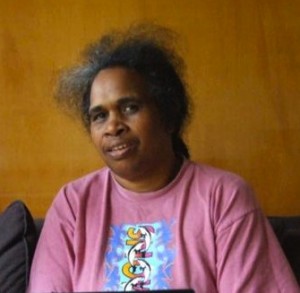 Congratulations to Lois Kusilifu (Solomon Islands) who is graduating this week with a Master of Indigenous Studies degree.
Congratulations to Lois Kusilifu (Solomon Islands) who is graduating this week with a Master of Indigenous Studies degree.
Title: The Experiences of the Solomon Islands Seasonal Workers under the Recognised Seasonal Employer scheme in New Zealand
Supervisor: Dr.Alumita Durutalo
Abstract: “Oketa chalens na osem, pipol lo dea oketa laef stael differen, espeseli na swea. Ani smol samting swea.Iumi wea garem kastom,kaen ia barava nogud lo iumi. Sapos iu no doim eniting gud oketa swea lo iu nao, so hem na osem mi faesim. Hem nogud tumas lo mi taem mi herem oketa usim nem blo God mi fil nogud tumas. Nara samting moa,mifala waka anda nit presa. Mifala bae no rest, taem,taem, everiting mas in taem. Osem gogo mifala big woman gogo osem smol pikinini tu becos mifala waka anda presa. Ma samting mi saenem na ia. Osem sapos oketa lelebet meanim wei blo iumi bae gud(9WW).”
(The challenges I have come across is that the lifestyle is different. Especially the way swearing and blasphemy are a common everyday speech. Not only that, we work under pressure. We don’t rest for long. We are expected to do things on time. This makes us feel as if we are kids. If only they understood us)
This study focuses on e focus the experiences of the Solomon Islands seasonal migrant workers in New Zealand’s Recognised Seasonal Employer (RSE) scheme. This scheme enables low-skilled seasonal migrant workers, to work temporarily in New Zealand’s horticulture and viticulture industries for a period of three to seven months each year. Interviews were conducted in two different locations- Wairarapa, New Zealand and Honiara- Solomon Islands. Qualitative research methods were used in gathering primary and secondary information. The findings of the research suggest that Solomon Islanders have benefited from participating in the scheme in ways they expressed as in building of permanent homes, advanced payment of school fees and undertaking of small businesses.
This study focused on extending the boundaries of earlier research, such as that done on Ni-Vanuatu seasonal workers in New Zealand, by having an in-depth focus on the social experiences of the Solomon Islands seasonal workers in New Zealand. What were the social experiences of the Solomon Islands seasonal workers and what could be done to improve employer and employee relations through policies to enable the benefit of all, the employers, employees and the countries involved.

